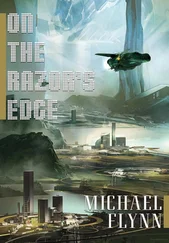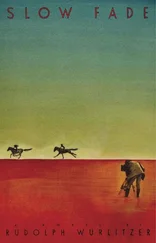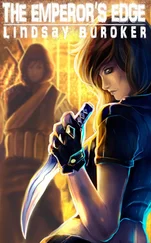Except for an occasional appearance on the bridge, wearing Chinese slippers and baggy French underwear, Captain Dorfheimer remained in his cabin, struggling over a letter to his wife that compared his situation to an accelerating whirlpool of tedium, a condition that made him feel as if he was descending into a black hole. He no longer referred to his charts, and at the close of each day the logbook was marked with the same comment: No wind.
Passengers slumped on the deck as if stranded inside a waiting room. The German merchants staked out a place on the stern, playing a game of chess, sometimes taking an entire afternoon to move one piece. The Pole walked back and forth, slapping his forehead, singing and muttering to himself. Neither German noticed when he picked up a knight from the board and dropped it overboard. The Finn talked to the bare-breasted goddess on the ship's prow, confessing his marital sins as well as his secret sexual fantasies. Cox read the opening page of The Decline and Fall of the Roman Empire over and over. Zebulon lay on his back, staring at the empty, relentless sky. Once Delilah's ankles drifted past and he heard her say to the Finn: "Have… you… ever… been… to… Iceland…?" And always there was Stebbins, whose imagination he continued to fill with accounts of Indian wars, Texas shoot-outs, and gun running in Mexico. Or maybe it wasn't Stebbins but the lethargic drift of his own mind-stream.
Despite the brutal heat he continued to sleep in his cabin, listening to Delilah and the Count. When they were silent he wondered if they had died, until one night, just to find out, he opened the door to their cabin. The Count was sitting on the bunk, Delilah mounted on top of him, her legs wrapped around his waist.
"Abandon all hope all ye who enter here," the Count said, quoting Dante as Zebulon backed out the door.

 nother week passed with no hint of wind. Aching lungs gasped for air, bodies remained unwashed, faces were swollen and blistered, stomachs cramped with diarrhea or constipation.
nother week passed with no hint of wind. Aching lungs gasped for air, bodies remained unwashed, faces were swollen and blistered, stomachs cramped with diarrhea or constipation.
On the twenty-third day of the doldrums, the Polish merchant appeared on the stern deck, wearing a blue suit and tie and carrying a wooden suitcase. Counting out loud he took twenty-three steps to the ship's railing, then twenty-three steps back, then twenty-three forward again. No one noticed when he swung his legs over the railing.
"Ladies and gentlemen," he announced in a loud, determined voice, "kings and queens, sailors and sea creatures, slaves and masters. This man no longer knows if he is dead or alive. Perhaps he is not even Polish. Perhaps this life doesn't exist or has never existed. Perhaps this is not a ship but a floating coffin. Perhaps we are dreaming and will wake up to find that everything is the same.
When he jumped overboard, there wasn't enough time or energy to lower a lifeboat. Soon all that remained of him was his wooden suitcase, which they watched all that day and into the evening, float slowly towards the horizon like a miniature casket.
The following morning, the Captain's eulogy was brief. "We are guests on this earth. We come and we go. No one knows when or how his time will come. We can only have faith and abide."
He nodded to the Count, who was seated next to him, his cello poised between his knees. With a dramatic flourish the Count launched into a Bach suite, only to have two strings crack out like pistol shots.
As if a curse had been lifted, a faint breeze suddenly shivered across the water. Overwhelmed by this sign of grace, passengers and crew turned their swollen faces towards the breeze. The Finn shouted, pointing to a frigate bird hovering off the starboard bow. Cox sank to his knees. The two Germans raised their hands over their heads, reaching for handfuls of wind. Zebulon shook the Finn's hand. The crew hugged and slapped each other on their backs, then scurried aloft. Sails snapped and billowed and the ship began to move, slowly at first and then at a brisk five knots.
They crossed the equator under full sail. The Captain, true to his word, ordered a grand celebration, even providing a generous selection from his private stock of Chilean wine, Mexican mescal, and Spanish rum.
That night the crew appeared on deck in white jackets and stand-up collars. The passengers wore their finest European and New York clothes. The Count was resplendent in a combination Russian-English military uniform of red and black striping, Delilah elegant in a high-busted Parisian evening dress and white bonnet. Zebulon, accompanied by cheers, appeared in a leather overcoat that he had borrowed from the Finn, topping it off with an improvised hat made from sail cloth and a piece of the Captain's French underwear.
The Captain fired three pistol shots.
The passengers, except for Cox, who had crossed the equator before, were ceremoniously dunked into a large tub of salt water. After their bodies were smeared with red and yellow dye, they were made to crawl through a gauntlet where the crew spanked them with paddles. After a long, incomprehensible speech praising Neptune and local maritime deities, the Captain announced that Zebulon would be given a special sacrificial role, a decision greeted with wild cheers and foot-stomping approval.
After Zebulon's head was shaved, a blue circle was painted around his face, followed by two red lines across his forehead and down his cheeks.
When the Captain asked him to dance, Zebulon shuffled around the deck, crying out a vision prayer with two sailors prancing behind him, one playing an accordion, the other pounding an African drum:

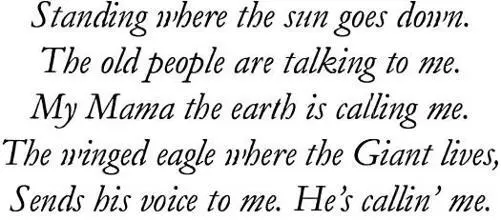

He stopped in front of Delilah. "You are the spirit who lives where the sun goes down, who takes care of all the waters in all the lands. Tell me if that ain't true."
"If you wish it to be so, then it will be," she replied.
Taking a cigar from the Captain, she blew smoke over his face and head. Then she gave the cigar to Zebulon, who repeated the act on the Count and then on the rest of the passengers:
"Listen here, Wakan Tanka, Great Spirit!" he cried out, walking back and forth. "Listen to this man askin' to purify himself. Because of you the wind has come again and our journey goes forward. Now we're on the move! It's no flatlander or greenhorn that's callin' out to you. It's an old mountain wolf askin' for enough power and light to shake us all loose from where we've been stuck between the worlds. Is that too much to ask? Any way you look at it, it's a job that only you, the Creator, can handle; after all, Wakan Tanka, you're the one who gives the birds and fish the power to fly and swim…. Listen to this man, Wakan Tanka! Give us a sign. Let us know we ain't lost: Hecheto wa~elo!"
Drums pounded and horns blared as the Captain, along with the crew and passengers, wept and sang and shouted their thanks through the night.

 hen Zebulon woke at dawn the passengers were still passed out on deck, all except for the Count and Delilah, who were standing by the ship's rail.
hen Zebulon woke at dawn the passengers were still passed out on deck, all except for the Count and Delilah, who were standing by the ship's rail.
Читать дальше
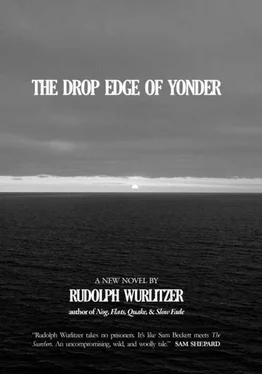

 nother week passed with no hint of wind. Aching lungs gasped for air, bodies remained unwashed, faces were swollen and blistered, stomachs cramped with diarrhea or constipation.
nother week passed with no hint of wind. Aching lungs gasped for air, bodies remained unwashed, faces were swollen and blistered, stomachs cramped with diarrhea or constipation.



 hen Zebulon woke at dawn the passengers were still passed out on deck, all except for the Count and Delilah, who were standing by the ship's rail.
hen Zebulon woke at dawn the passengers were still passed out on deck, all except for the Count and Delilah, who were standing by the ship's rail.
